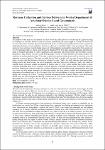Revenue Collection and Service Delivery in Works Department of Amolatar District Local Government
Abstract
The purpose of this study was to examine the effect of revenue collection on service delivery in Uganda focusing
on employees in Amolatar District Local Government. Specifically, the study sought to: examine the sources of
revenue collection in Amolatar district, assess the level of service delivery in Amolatar district and to examine the
relationship between revenue collection and service delivery in Amolatar district local government. The study
employed cross sectional research design; employed both quantitative and qualitative approaches from sample size
of 113 respondents that was drawn using Krejcie & Morgan (1970). The study used questionnaires and interview
guide as research techniques to collect quantitative and qualitative data from primary and secondary sources.
Quantitative data analysis was done using SPSS package version 23 while thematic and content analysis was
employed to analyse qualitative data. The study revealed market dues, trading license and local service tax are all
important sources of revenue. The study revealed that the level of quality and coverage of service delivery are
above average while the timeliness of services is below average. Finally, the study indicated that market dues,
trading license and local service tax are all positively associated with service delivery. Finally, the results of
multiple linear regression yielded an adjusted R Square value of 0.324, which implied that jointly, revenue
collection contribute about 32.4% variation in service delivery in Amolatar District Local Government. Based on
the above findings, the study concluded that Amolatar district local government should strengthen their effort and
also come out with proper strategies of collecting revenue for those sources studied and leadership and the
technocrats of Amolatar needs to do a lot more in the area of the timeliness of service provision in addition to
quality and coverage of services. The study therefore recommended that Amolatar District Local Government
should come out with strategies of collecting revenue from all those sources which have been studies.
Collections
- Research Articles [29]

